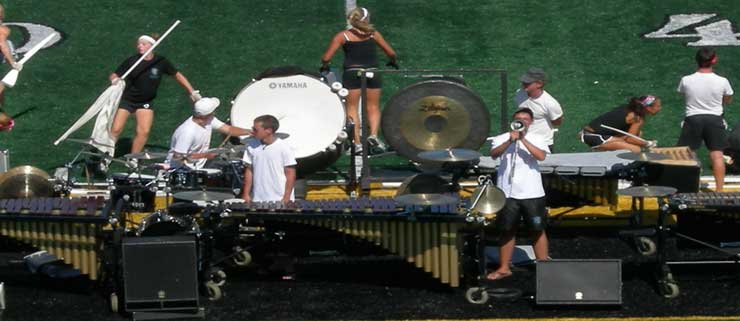 I got to thinking the other day of all the stupid things that I have done over the years in my classes that were done with the best of intentions, yet wound up either failing miserably or falling far short of their goals. Since this entire site was originally built on the idea of using my own experiences to help other teachers improve in their own situations I thought it would be nice to return to those roots a bit and do a series of blog posts on little rules of thumb for music teachers that even today I occasionally catch myself breaking. Old habits are hard to break, and to be honest, there may be those who read this that think I am totally wrong. If so, I urge you to post a comment and let us know your side of the story. Today's first post in the series focuses on private and small group lessons and the fact that occasionally many teachers wind up listening more to their own performance rather than their students.
I got to thinking the other day of all the stupid things that I have done over the years in my classes that were done with the best of intentions, yet wound up either failing miserably or falling far short of their goals. Since this entire site was originally built on the idea of using my own experiences to help other teachers improve in their own situations I thought it would be nice to return to those roots a bit and do a series of blog posts on little rules of thumb for music teachers that even today I occasionally catch myself breaking. Old habits are hard to break, and to be honest, there may be those who read this that think I am totally wrong. If so, I urge you to post a comment and let us know your side of the story. Today's first post in the series focuses on private and small group lessons and the fact that occasionally many teachers wind up listening more to their own performance rather than their students.
Tutti Torment- Every beginning music student is different.
Some are more confident playing in groups, others want to show off and play solo. You can easily tell who the latter ones are, they are the ones that continue to play or practice a part even when you have asked them not to. If you are teaching lessons in small groups, find a way to work solo playing into the routine, even if it means sacrificing something that you really wanted to get to on the lesson plan. Work opportunities into the lessons to let students show off what they can do on their own. At the same time this will also help the more timid students come out of their shell once they realize that they will have to play things by themselves too. Just be sure to (at first) pick stuff that you are certain all students will be able to play successfully so that even the timid ones will have a positive experience.
Let The Kids Play (By Themselves)!
Don't get me wrong, I'm not saying that a teacher shouldn't play along with their students, I'm just saying that they shouldn't do it all the time. For one thing, when you play your instrument you are not really able to objectively listen to the student at the same time. Instead we wind up listening to both, and more often than not while we might catch the wrong notes or wrong rhythms the student is playing, we will miss the little stuff like tonguing problems or breath support issues that also need to be addressed. Plus, if you always play with your students during their lessons you are also not giving them a chance to play solo and develop their own self confidence in their abilities. You wind up being a crutch that they depend on to get things right, and mistakes that they might make by themselves do not get made when playing along with you or someone else.







 Scroll down to view the comparison chart of over a dozen different portable digital audio recorders.
Scroll down to view the comparison chart of over a dozen different portable digital audio recorders.